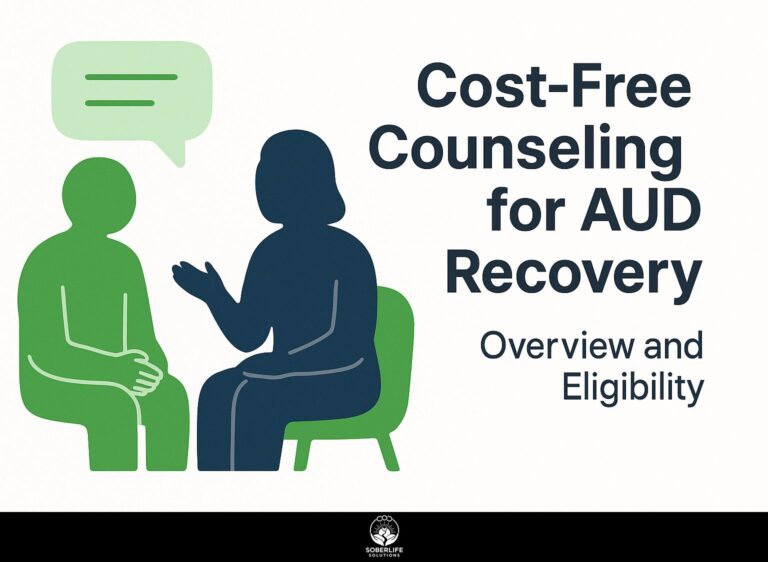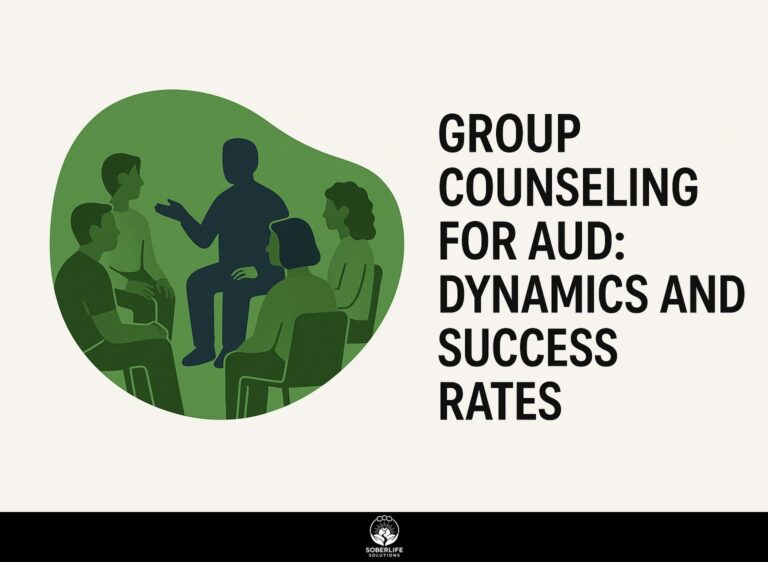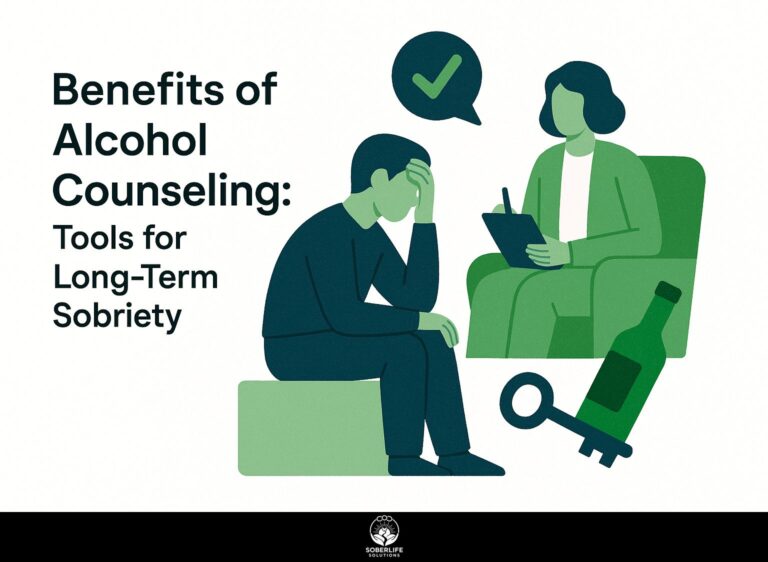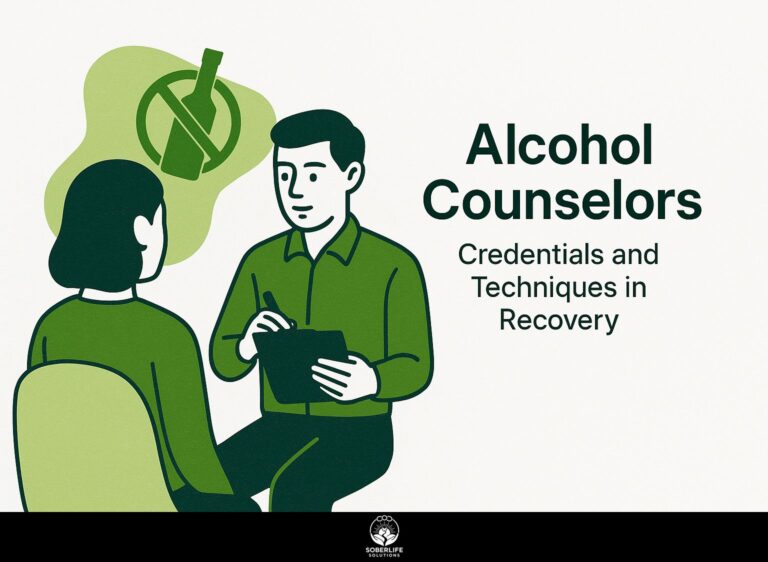Couples and Family Counseling for AUD Recovery: Role and Benefits
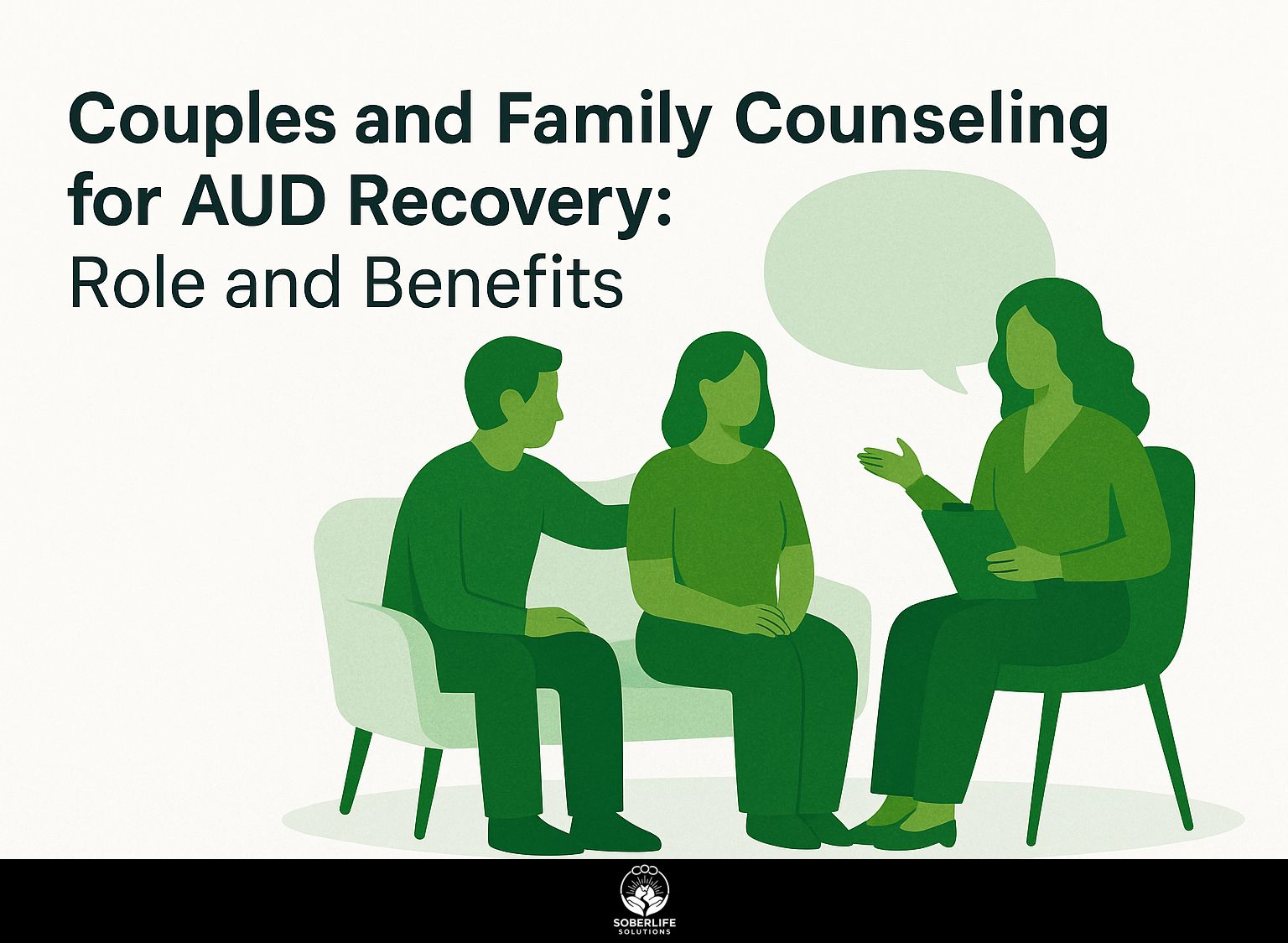
Recovering from alcohol use disorder (AUD) can be hard, especially for families and couples. Family therapy is important for improving how a family works together and assists members in starting changes that support recovery. In this article, we will discuss the advantages of couples and family counseling in AUD recovery, focusing on how it builds stronger relationships, enhances communication, and tackles root problems. Learn how help from family and friends can greatly affect the process of getting better.
Key Takeaways:
Explaining Alcohol Use Disorder (AUD)
Alcohol Use Disorder (AUD) is characterized by an inability to control alcohol consumption despite negative consequences, affecting mental and physical health.
AUD is chronic, impacting approximately 14.1 million adults in the U.S., with a typical onset age of 18 to 29.
Diagnostic criteria from the DSM-5 include recurrent alcohol use leading to significant impairment, tolerance buildup, and withdrawal symptoms. People with AUD might feel a strong desire to drink and often find it hard to reduce their intake, showing how ongoing the condition can be. For those interested in a comprehensive overview, this diagnostic criteria checklist by RAND offers detailed insights into the condition.
Knowing these details can help people and healthcare professionals identify and deal with this widespread problem effectively. Additionally, understanding when to seek professional help is crucial, and our guide on recognizing the right time to ask for professional support can provide valuable assistance in navigating this challenging journey.
Effects of AUD on Couples and Families
Alcohol use disorder can seriously affect how a family works, causing emotional upset and difficult relationships between family members.
Research indicates that approximately 25% of children in families affected by Alcohol Use Disorder (AUD) develop emotional problems, such as anxiety and depression. These issues can stem from instability, neglect, and conflict that often arise in alcoholic households. According to Verywell Mind, the impact of parental alcoholism can significantly disrupt a child’s emotional development.
To counterbalance this detrimental effect, supportive communication plays a critical role. Encouraging open and honest dialogues among family members nurtures emotional resilience.
Simple actions like regular family meetings or check-ins can help family members understand each other and feel connected, reducing the emotional problems linked to AUD.
The Role of Couples and Family Counseling
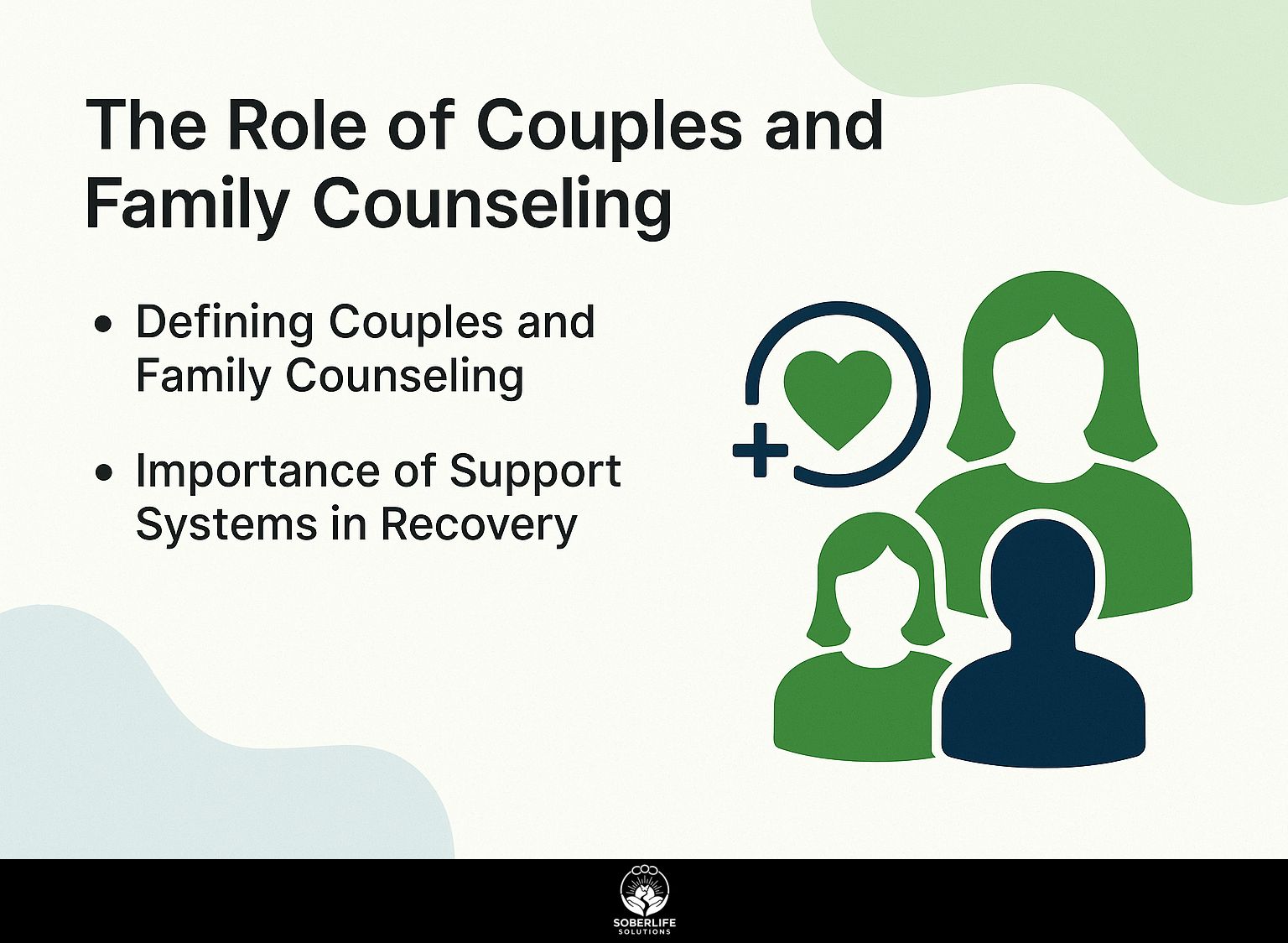
Getting help through counseling can be important for couples and families dealing with alcohol use disorder. It helps them fix and improve their relationships during the recovery process (check out our guide on how to improve quality of life during alcoholism recovery).
Defining Couples and Family Counseling
Couples and family counseling works to better relationships and communication between family members dealing with AUD using organized therapy methods.
Multidimensional Family Therapy (MDFT) is a treatment approach that focuses on both the person and family relationships that lead to substance use.
MDFT involves assessing family interactions, facilitating open dialogue, and teaching coping skills. Therapists often use role-playing to practice communication techniques and employ motivational interviewing to encourage commitment to change.
This model highlights the importance of involving every family member, creating a complete recovery plan that strengthens people and improves their relationships.
Importance of Support Systems in Recovery
Strong support systems are important for recovering from AUD, giving necessary emotional and practical help to people and their families.
Research shows that recovery rates improve significantly when family members are actively involved in the treatment process. For instance, a study found that 60% of individuals in recovery reported increased success when their families participated in therapy sessions or support groups, a topic explored in depth by Cambridge University Press.
Practical steps families can take include:
- Attending family counseling sessions
- Joining groups like Al-Anon, or exploring how to join online support groups for additional guidance.
- Providing a safe, non-judgmental environment at home
By encouraging open communication and mutual respect, families can build a supportive environment, improving the healing process for loved ones.
Benefits of Counseling for AUD Recovery
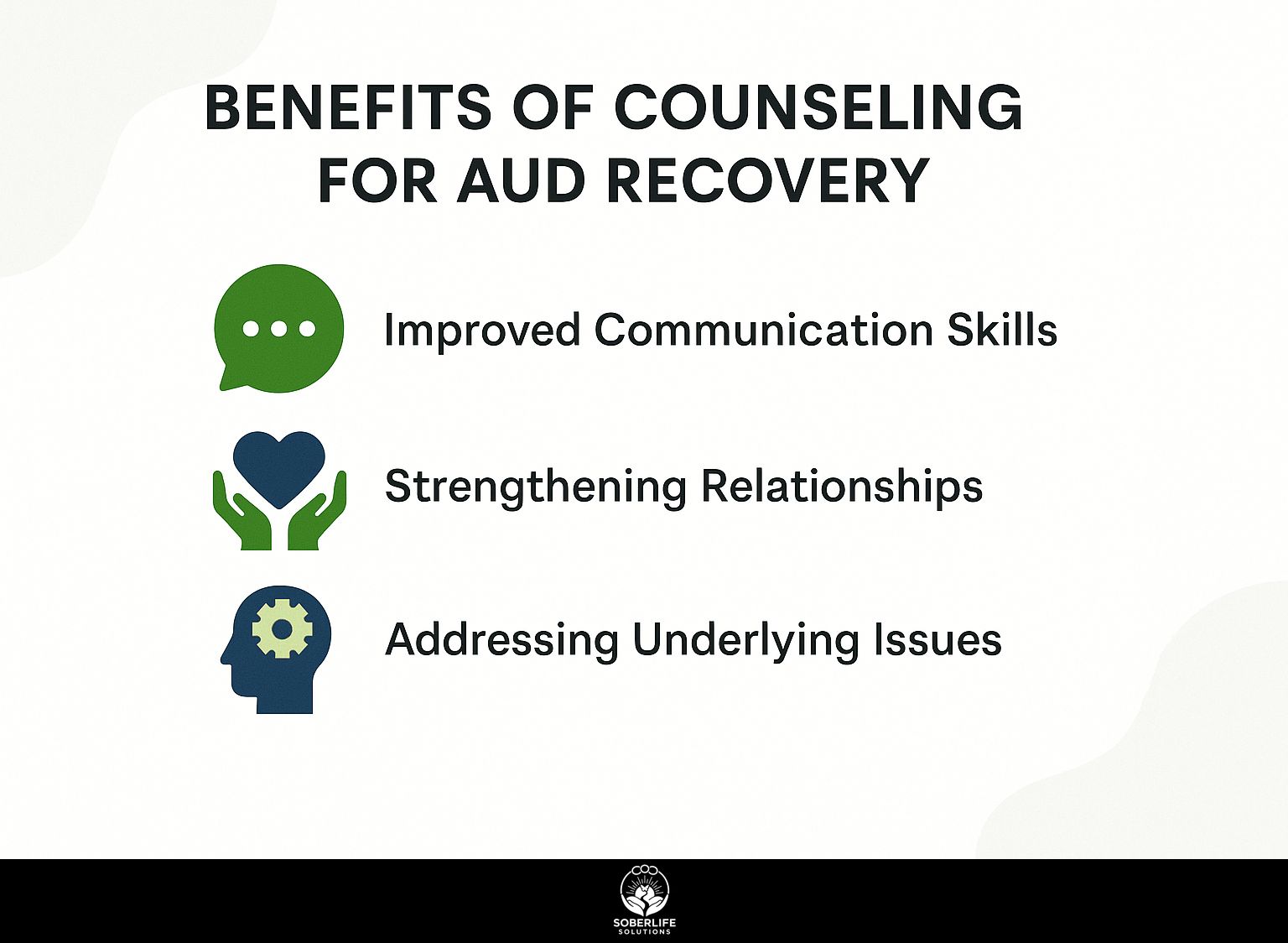
Counseling for AUD recovery improves communication and builds stronger relationships, addressing the root causes that may lead to drinking.
Improved Communication Skills
Counseling strengthens communication skills, allowing family members to openly discuss their feelings and concerns, leading to better relationships and support.
One effective method for enhancing family communication is the use of ‘I-Statements.’ This technique encourages individuals to express their emotions without assigning blame, reducing defensiveness.
For example, instead of saying, “You never listen to me,” one might say, “I feel ignored when I’m not heard.” Setting up regular family meetings can help everyone talk openly and share their thoughts.
Tools like family therapy apps, such as Joyable, can provide resources and techniques to develop these skills further. By incorporating these strategies, families can significantly improve their interactions and emotional connections.
Strengthening Relationships
Therapeutic treatments can greatly improve relationships among family members, building strength and dedication when dealing with AUD challenges.
- To strengthen family bonds, hold regular family meetings where everyone can discuss their feelings and experiences related to substance use issues.
- Engage in shared activities, such as family game nights or outdoor excursions, which can promote teamwork and open communication.
- Track progress by using relationship satisfaction scores from family therapy sessions to assess improvements over time.
- Putting these practices in place can build strong connections and a supportive environment for everyone to address AUD issues together.
Addressing Underlying Issues
Counseling helps identify and deal with deep psychological problems that might play a role in a person’s AUD, supporting a more complete recovery process.
Including Cognitive Behavioral Therapy (CBT) in counseling can greatly help people control alcohol use triggers.
One effective method is utilizing thought records, where clients document thoughts and feelings associated with cravings. This helps people become more aware and question negative ideas-such as thinking alcohol is needed to have fun in social settings.
Another intervention, exposure therapy, gradually exposes individuals to triggers in a controlled environment, helping them learn coping strategies without resorting to alcohol. By using these methods, clients can build better habits in response to their triggers, leading to long-term recovery.
Types of Counseling Approaches
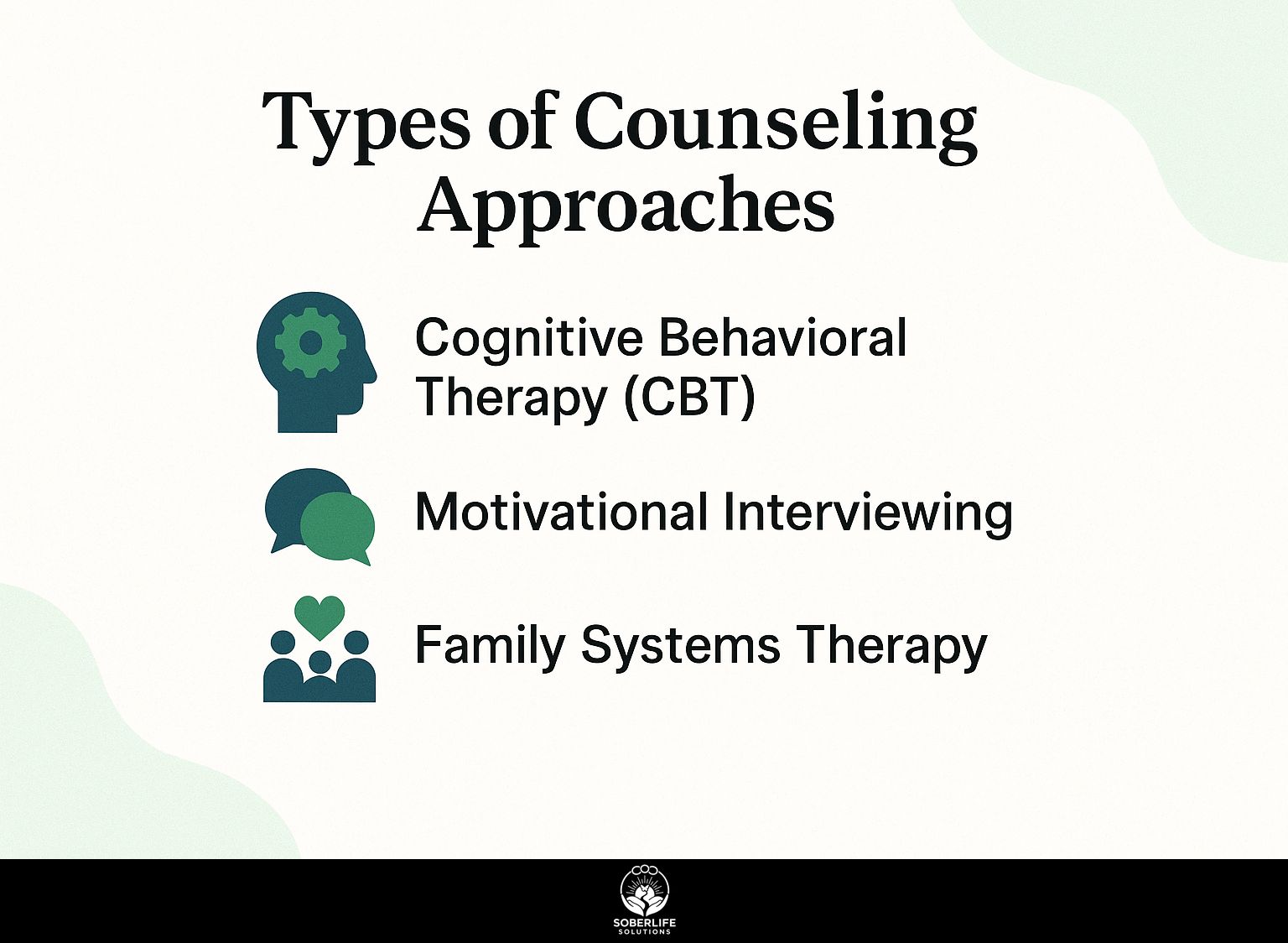
There are different counseling methods designed to meet the specific needs of couples and families dealing with AUD, each with its own techniques and objectives. Among these, Cognitive-Behavioral Therapy techniques are particularly noteworthy for their effectiveness in aiding recovery.
Cognitive Behavioral Therapy (CBT)
Cognitive Behavioral Therapy (CBT) is a common therapy method that helps people change harmful thinking habits linked to alcohol use.
CBT sessions typically include identifying triggers, cognitive restructuring, and practicing coping strategies.
Exercises might involve keeping a thought record to track cravings and associated thoughts or role-playing situations where alcohol might be consumed.
Homework assignments often encourage clients to apply these techniques in daily life, aiding in skill development.
Studies indicate that CBT can lower symptoms of alcohol use disorder by up to 50%, proving to be an effective method for lasting recovery.
Using these methods together increases the chances of long-term behavior change.
Motivational Interviewing
Motivational Interviewing (MI) is a type of counseling that focuses on encouraging people to change harmful habits related to AUD.
In application, MI employs reflective listening to validate clients’ feelings and open-ended questions to encourage deeper exploration of their motivations.
For example, asking a client, “How does alcohol affect your life?” can encourage them to explain why they want to make changes. Creating a non-judgmental environment helps clients feel safe to express doubts.
Therapists might also highlight previous successes in similar situations to reinforce confidence. These methods help build a relationship that helps clients make concrete progress towards getting better.
Family Systems Therapy
Family Systems Therapy is designed to improve communication and relationships within families by viewing the family as a complex system.
This method looks at how one person’s actions impact the whole family, especially concerning problems like Alcohol Use Disorder (AUD).
For example, a therapist may lead conversations that reveal ways family members support harmful behaviors, which increases awareness. Families can use role-play to try out different situations and responses.
Successful results often involve better ways to talk, less fighting, and more emotional backing, which helps people dealing with AUD to get help and build better connections.
Challenges in Couples and Family Counseling
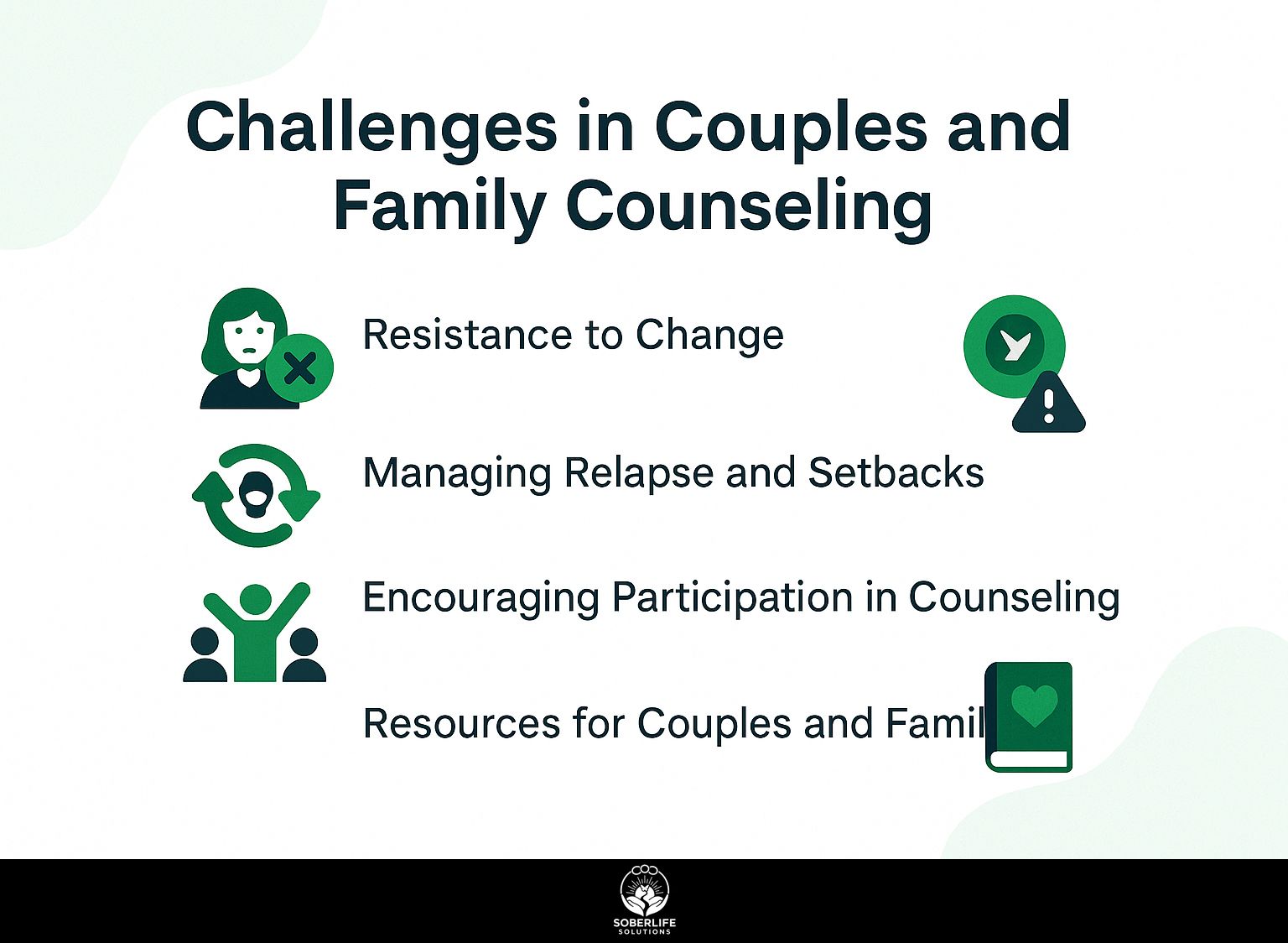
While counseling offers many benefits, families often face unique challenges that can make therapy difficult.
Resistance to Change
Resistance to change is a typical problem in family counseling, often coming from long-standing relationship patterns and fear of what lies ahead.
To manage this resistance effectively, begin by establishing trust through transparent communication. This could involve discussing the reasons behind proposed changes in a safe environment.
Techniques like motivational interviewing can help facilitate open dialogues. Introduce small, incremental changes rather than sweeping shifts; for example, suggest gradually altering family routines instead of abruptly changing long-standing traditions.
In therapy sessions, clients might begin by talking about these changes, letting the therapist gently help them with their fears, creating a cooperative environment.
Managing Relapse and Setbacks
Handling relapse is an essential part of counseling for alcohol use disorder recovery. It involves planning ahead and providing strong support systems.
To effectively prevent relapse, individuals should focus on developing strong coping skills, such as mindfulness and stress management techniques.
Engaging in support groups like Alcoholics Anonymous can provide essential community backing. Creating a crisis plan is essential: identify the reasons they occur, outline steps to manage them, and provide emergency contact information.
Statistics show that approximately 40-60% of individuals experience relapse, underscoring the importance of being prepared.
Consistent follow-up with a counselor can also significantly improve recovery timelines, with structured sessions recommended weekly during the initial stages.
Encouraging Participation in Counseling
Joining counseling supports the person with AUD and helps the family recover and gain knowledge.
To engage in counseling effectively, start by organizing a family meeting to discuss concerns openly. Include family members in discussions-pick someone to share each person’s opinion so everyone gets a chance to speak.
Next, research and select a therapist specializing in addiction therapy. Resources like Psychology Today provide directories to find licensed professionals.
Once a therapist is chosen, approach the first session with an open mind, allowing each member to express feelings and expectations. This inclusive approach can significantly strengthen family bonds while addressing the underlying issues related to AUD.
Resources for Couples and Families
Many resources are available to help couples and families dealing with AUD, including books and professional therapy services.
Books such as ‘The Recovery Book’ and ‘Codependent No More’ give guidance on managing difficulties and learning about relationships.
Websites like the National Institute on Alcohol Abuse and Alcoholism (NIAAA) provide extensive materials on treatment options. For those considering different therapeutic approaches, understanding the benefits of behavioral therapy for AUD can be crucial.
Joining local support groups, like Al-Anon or Couples Recovery, can help build community connections.
For professional help, try platforms like BetterHelp or Talkspace. They connect users with licensed therapists who focus on addiction and family issues.
Frequently Asked Questions
What is the role of couples and family counseling in AUD recovery?
Couples and family counseling is important for people with alcohol use disorder (AUD) as it helps them recover by focusing on how alcoholism affects their relationships. It offers support and advice for better communication and ways to handle challenges.
How does couples and family counseling benefit those in AUD recovery?
Counseling for couples and families can help people recovering from alcohol use disorder by making their relationships better and giving them support during recovery. It can also help identify and address underlying issues that may contribute to alcohol abuse.
Who can benefit from couples and family counseling for AUD recovery?
Anyone struggling with AUD can benefit from couples and family counseling. It can be especially helpful for individuals who have strained relationships with their loved ones due to their alcohol addiction.
What can I expect during couples and family counseling for AUD recovery?
During counseling sessions, you and your loved ones will work with a licensed therapist to address issues related to alcoholism and its impact on your relationships. You can expect a safe and non-judgmental space to share your experiences and learn effective communication and coping skills.
Is couples and family counseling necessary for AUD recovery?
While not necessary for everyone, therapy for couples and families can be very helpful in dealing with Alcohol Use Disorder and improving the well-being of both individuals and their families. It can also reduce the risk of relapse by addressing underlying issues and strengthening relationships.
Can I attend couples and family counseling even if my partner/loved one is not ready for AUD recovery?
Yes, you can attend counseling even if your partner or loved one is not ready to address their AUD. Your therapist can still offer support and advice for your personal growth and help strengthen your relationships right now.

